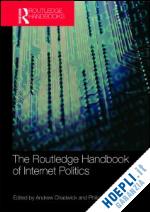1. Introduction Andrew Chadwick and Philip N. Howard Part 1: Institutions 2. The Internet in US Election Campaigns Richard Davis, Jody C. Baumgartner, Peter L. Francia, and Jonathan S. Morris 3. European Political Organizations and the Internet: Mobilization, Participation and Change Stephen Ward and Rachel Gibson 4. Electoral Web Production Practices In Cross-National Perspective: The Relative Influence Of National Development, Political Culture, and Web Genre Kirsten A. Foot, Michael Xenos, Steven M. Schneider, Randolph Kluver, and Nicholas W. Jankowski 5. Parties, Election Campaigning and the Internet: Toward A Comparative Institutional Approach Nick Anstead and Andrew Chadwick 6. Technological Change and the Shifting Nature of Political Organization Bruce Bimber, Cythia Stohl, and Andrew J. Flanagin 7. Making Parliamentary Democracy Visible: Speaking to, With and For the Public in the Age of Interactive Technology Stephen Coleman 8. Bureaucratic Reform and E-Government in the United States: An Institutional Perspective Jane E. Fountain 9. Public Management Change and E-Government: The Emergence of Digital Era Governance Helen Margetts Part 2: Behavior 10. Wired to Fact: The Role of the Internet in Identifying Deception During the 2004 US Presidential Campaign Bruce W. Hardy, Kathleen Hall Jamieson and Kenneth Winneg 11. Political Engagement Online: Do the Information Rich Get Richer and the Like-Minded More Similar? Jennifer Brundidge and Ronald E. Rice 12. Information, the Internet and Direct Democracy Justin Reedy and Chris Wells 13. Toward Digital Citizenship: Addressing Inequality in the Information Age Karen Mossberger 14. Online News Creation and Consumption: Implications for Modern Democracies David Tewksbury and Jason Rittenberg 15. Web 2.0 and the Transformation of News and Journalism James StanyerPart 3: Identities 16. The Internet and the Changing Global Media Environment Brian McNair 17. The Virtual Sphere 2.0: The Internet, the Public Sphere and Beyond Zizi Papacharissi 18. Identity, Technology and Narratives: Transnational Activism and Social Networks W. Lance Bennett and Amoshaun Toft 19. Theorizing Gender and the Internet: Past, Present, and Future Niels Van Doorn and Liesbet Van Zoonen 20. New Immigrants, the Internet, and Civic Society Young-Chen Kim and Sandra J. Ball-Rokeach 21. One Europe, Digitally Divided Jan Van Dijk 22. Working Around the State: Internet Use and Political Identity in the Arab World Deborah L. Wheeler Part 4: Law and Policy 23. The Geopolitics of Internet Control: Censorship, Sovereignty and CyberspaceRonaldJ. Diebert 24. Locational Surveillance: Embracing the Patterns of Our Lives David J. Phillips 25. Metaphoric Reinforcement of the Virtual Fence: Factors Shaping the Political Economy of Property in Cyberspace Oscar H. Gandy, Jr. and Kenneth Neil Farrall 26. Globalizing the Logic of Openness: Open Source Software and the Global Governance of Intellectual Property Christopher May 27. Exclusionary Rules? The Politics of Protocols Greg Elmer 28. The New Politics of the Internet: Multistakeholder Policy Making and the Internet Technocracy William H. Dutton and Malcolm Peltu 29. Enabling Effective Multistakeholder Participation in Global Internet Governance Through Accessible Cyberinfrastructure Derrick L. Cogburn 30. Internet Diffusion and the Digital Divide: The Role of Policymaking and Political Institutions Kenneth S. Rogerson and Daniel Milton31. Conclusion Philip N. Howard and Andrew ChadwickBibliography











